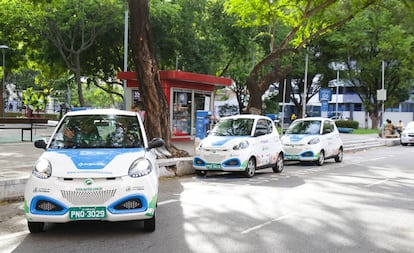Latin American cities back green transport in fight against pollution
Bogota, Buenos Aires and Fortaleza in Brazil are rolling out very different initiatives to cut CO2 emissions
New projects in Latin America are putting the focus squarely on green transportation in a part of the world where 80% of the population lives in urban areas and where demand for mass transit is high, but which has also seen economic slowdown and a squeezing of municipal budgets in recent years.

The projects in the Colombian capital of Bogota, Argentina’s Buenos Aires and Fortaleza, the fifth-largest city in Brazil, were on show at the recent Transforming Transportation event, which was sponsored by the World Bank and the World Resources Institute.
In Bogota, which is one of the most densely populated cities in South America, authorities last year began dedicating half of their municipal budget to transportation, with 80% of that amount earmarked for sustainable mass public transit, according to transport chief Juan Pablo Bocarejo.
Only 16% of journeys in Bogota are undertaken using private transport and the public bus network is one of the most heavily used in the world. But the city is still suffering traffic jams and pollution problems.
Brazil’s Fortaleza is fighting pollution with low-cost projects such as bicycle lanes
Bogota’s aim, according to Bocarejo, is to get 80% of the population living within one kilometer of public transport. To that end – and to help prevent rampant urban sprawl – construction of an underground railway network will begin in 2018.
In Buenos Aires, home to around 13 million people, some 18,000 buses are the backbone of the transportation network with 80% of all journeys undertaken on these vehicles.
While authorities recognize it is impossible to improve the quality of the network all at once, the objective now is to make the fleet greener. Buenos Aires plans to roll out 50 electric buses over the next nine to 12 months, said Manuela López Menendez, the transport works secretary at Argentina’s Transportation Ministry.
“We also hope to improve the train network so that more people use it,” she added.
Brazil’s Fortaleza is looking at the issue of green energy with a longer-term perspective. The coastal metropolis in the country’s north “has so many problems that sustainable development is still not a priority for most people,” said the former public services boss, Luiz Sabóia.
Buenos Aires plans to roll out 50 electric buses over the next nine to 12 months
But Fortaleza is now closely monitoring greenhouse gases and has targeted a 20% reduction in those emissions by 2030. To help reach this target, authorities are concentrating on low-cost solutions such as the creation of 200 kilometers of bicycle paths and 98 kilometers of bus-only lanes. “There was a certain level of resistance to converting one of the lanes in the city’s main avenue into a bus lane but so many people use this form of transport that it seemed better to dedicate 25% of road space to it,” Sabóia said.
Nine out of 10 people in the world breathe polluted air, according to the World Health Organization, with traffic being the number one culprit.
At the same time, 27% of the world’s energy production is swallowed up by the transportation sector as is 60% of global crude oil production. The industry will have to undergo a complete overhaul to avoid global warming and a temperature rise of 2°C this century, according to the 125 countries who signed on to the Paris Agreement of 2016.
English version by George Mills.
Tu suscripción se está usando en otro dispositivo
¿Quieres añadir otro usuario a tu suscripción?
Si continúas leyendo en este dispositivo, no se podrá leer en el otro.
FlechaTu suscripción se está usando en otro dispositivo y solo puedes acceder a EL PAÍS desde un dispositivo a la vez.
Si quieres compartir tu cuenta, cambia tu suscripción a la modalidad Premium, así podrás añadir otro usuario. Cada uno accederá con su propia cuenta de email, lo que os permitirá personalizar vuestra experiencia en EL PAÍS.
¿Tienes una suscripción de empresa? Accede aquí para contratar más cuentas.
En el caso de no saber quién está usando tu cuenta, te recomendamos cambiar tu contraseña aquí.
Si decides continuar compartiendo tu cuenta, este mensaje se mostrará en tu dispositivo y en el de la otra persona que está usando tu cuenta de forma indefinida, afectando a tu experiencia de lectura. Puedes consultar aquí los términos y condiciones de la suscripción digital.








































